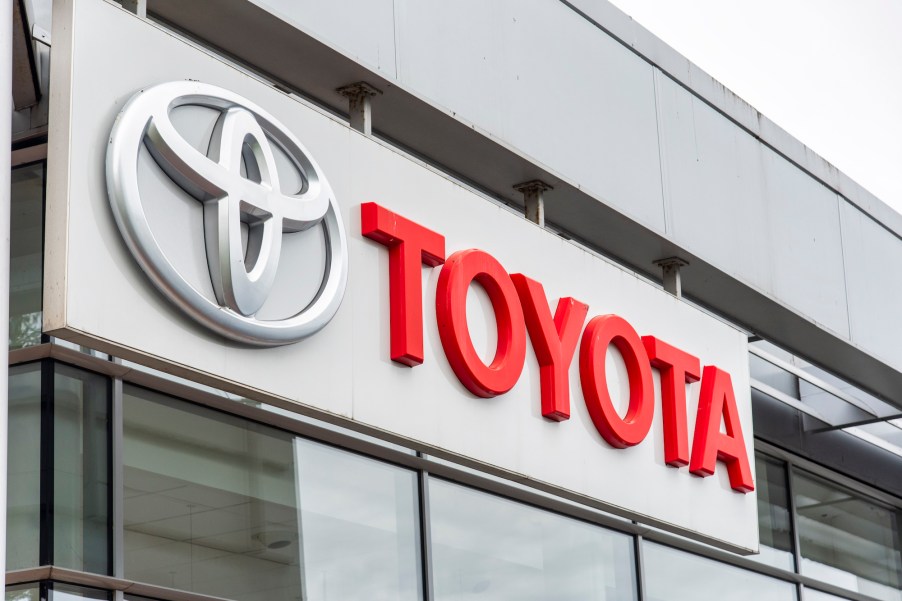
Toyota Confirms It Will Fight an ‘Entirely Improper’ $242 Million Judgment After a Lexus Crash Left 2 Children Brain-Damaged
In a 2016 accident involving a Lexus, two children sustained lasting traumatic brain injuries. A court found Toyota guilty of gross negligence after the family sued, but the automaker appealed. And recently, a Texas appellate court upheld the judgment, saying Toyota must still pay $242 million in punitive damages. However, the automaker confirms it will take its case to the state’s supreme court.
A 2016 Lexus crash changed a family forever
In September 2016, Benjamin and Kristi Reavis were traveling south on North Central Expressway in Dallas. Their small children — 3-year-old Owen and 5-year-old Emily — sat secured in car seats in the back of the family’s 2002 Lexus ES300. As they drove home from church, another car rear-ended their sedan at 45 mph.
Upon impact, the sedan’s front seats bent backward, throwing Benjamin and Kristi out of their seatbelts and launching them headfirst into their children. The duo made head-to-head contact with Own and Emily, causing severe head and brain injuries to the kids, Yahoo! Finance reported.
Their lawsuit claimed ‘gross negligence’
In a lawsuit against Toyota, which owns Lexus, the family blamed front-seat engineering faults on the seatback issue. And in 2018, a Texas jury awarded the Reavises $242 million after finding Toyota Motor Corporation guilty of gross negligence.
The jury concluded that the defects in the 2002 Lexus ES’s front seats caused the children’s injuries. In addition, the jury found that the seats were dangerous and that the automaker failed to warn consumers about them.
Toyota appealed the case, but the Dallas Fifth Court of Appeals recently upheld the 2018 personal-injury verdict. The court found the arguments and evidence provided by the Reavis family substantial enough to support gross negligence. According to the evidence the family presented, Toyota made an engineering decision to protect front-seat passengers but not rear-seat occupants.
Morning Star reported that the automaker failed to perform crash tests despite glaring evidence that such collisions were reported 77,000 times a year. In the court’s eyes, this amounted to gross negligence. The ruling came as a relief to Benjamin and Kristi, who stressed that the accident would not have occurred if Toyota had engineered their car’s front seats properly
How far will Toyota go to fight the ‘entirely improper’ ruling?
Toyota is considering its next steps following the February 14, 2021 ruling, CBS News reported. The automaker argues that the collapse of the Lexus ES300‘s front seats was due to the nature of the collision, not an engineering or design issue. Toyota contacted the National Highway Traffic Safety Administration and is awaiting a response.
According to CBS News, the NHTSA said the problem of collapsing front seats is underreported. The agency admitted it lacks jurisdiction and compelling evidence to take action against Toyota. Examining over 100 cases, the Reavis family’s lawyers argue that seatback collapses have caused injuries and deaths, with children suffering the most.
Asked for comment on the appeals court’s ruling, the automaker told MotorBiscuit: “Toyota is committed to providing its customers with safe and reliable transportation, and we sympathize with anyone in an accident involving one of our vehicles.
“While we respect the 2-1 decision of the Court, we continue to believe that the judgment is entirely improper given the undisputed facts that the 2002 Lexus ES300 meets or exceeds federal safety standards and that the accident itself was caused by a distracted driver whose SUV rear-ended the Reavis’ car at nearly 50 mph,” Toyota added.
“This case presents a number of important legal issues in Texas, as noted by the dissenting judge who found the plaintiffs’ claims ‘unsustainable.’ We look forward to presenting our case to the Texas Supreme Court for consideration.”


